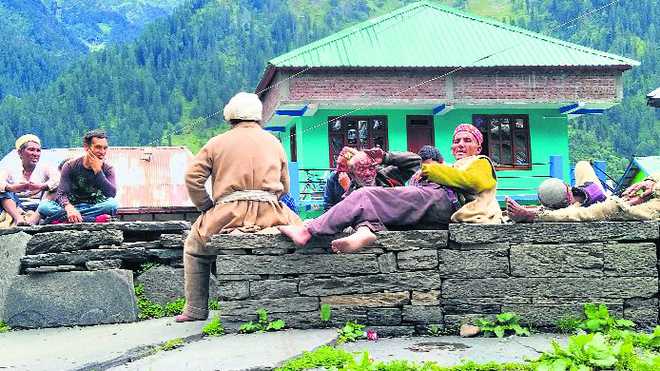Changing contours of Malana
Suneela Sharma
When after two decades, one stands under the old, rusted arch of the iron-gate that leads to a three-and-a-half kilometre tedious climb to Malana village, shivers of anticipation run down one’s spine.
There is a reason for this. Twenty years ago, Malana used to be a mystic mythological hamlet of a handful wooden houses with slate roofs that perched peacefully on the unapproachable and high rugged Kullu hills, where about 800 Malanis — “The purest and most innocent descendents of Alexander the Great” lived and ran the oldest democracy in the world. No outsider was allowed to spend even a night by the soldiers of the king — Jamlu; education was limited to the knowledge of ways of Malani life – rituals, traditions, language, folk songs and myths of Malana; justice was divine, instant and impartially imparted by the ministers of Jamlu (Rishi Jamdagni) at the threshold of his palace; people spoke the demon language; marriages were arranged within the closed community of the village and wedding ceremonies were organised at midnight. Malanis neither ate nor mingled with outsiders or even touched them. The best quality bhang, the prasada offered to their deity/god/king Jamlu of Malana, grew here. This was the time, when they learnt from the outside world a new name for their sacred crop – “weed” and their younger generation would predict in hushed whispers that it was fast becoming a favourite among outsiders and that they were willing to pay any sum of money for the purest product. In the years to come, it was to be called – Malana cream.
Malana cream, the brown bi-product, which was extracted in every household by rubbing the bhang leaves between palms of both hands, grew naturally in abundance in and around the village, and became a turnkey in the fortune and lifestyle of the innocent creed of Malana. The simple home-grown plant, in no time, became the green gold of Malana. Marijuana or cannabis was always an integral part of Malani life and household, as an indelible ingredient of delicacies like siddoo and modhi. Its seeds and oil were used as medicine for fever, indigestion, cold, cough and diseases as serious as cancer, its stem was used for making the mats for sitting in the temple, footwear (poolein) for wearing in the temple. With the spurt in the demand for marijuana and the greed of selling the holy bhang at the rate of gold, the traditional lifestyle was discarded in favour of a modern luxurious and easy lifestyle. The influx of foreigners at the doorstep of Malana as mendicants begging for nirvana weaned away the innocence out of the sanctorum of king Jamlu’s divine protection into the addiction of the easy flow of dollars and pounds. Though successive governments, dedicated teams of the Department of Drugs and Narcotics and numerous NGOs made attempts of bringing the people of Malana back to their heritage, it was too late by that time. Several alternate methods of growing corn, apples, peas and other vegetables were adopted over the time, but nothing would survive the wet monsoons, harsh winters and rough landscape of Malana, ideal only for growing this gift of the Gods — bhang. They stumbled on their efforts only because of lack of a foolproof, long-term strategy of rehabilitating Malana, an alternative livelihood that would at least be as lucrative as selling Malana cream.
Twenty years down, one is confronted with a very different Malana, where heaps of empty liquor bottles, wrappers, tetra packs, polythene (signifiers of civilised society) welcome you at the threshold, where maggi is cooked in modern modular kitchens, where family or social disputes and fights are reported to the police instead of the village devta, where televisions, dish antennas, geysers and heaters are common features of every home, where marriages are allowed outside the clan, where every family owns a concrete house alongside the old wooden ancestral homes, where village youth are ready to entertain you with sale offers and bargains of good quality Malana cream. In a nutshell – the dying heritage of Malana screams for help! According to the Genesis 2.3, Eden the Paradise was lost forever to the first of our race only because they ate the fruit of knowledge- a forbidden fruit that led to the knowledge of greed, fear and guilt. It’s time to save yet another fall.









